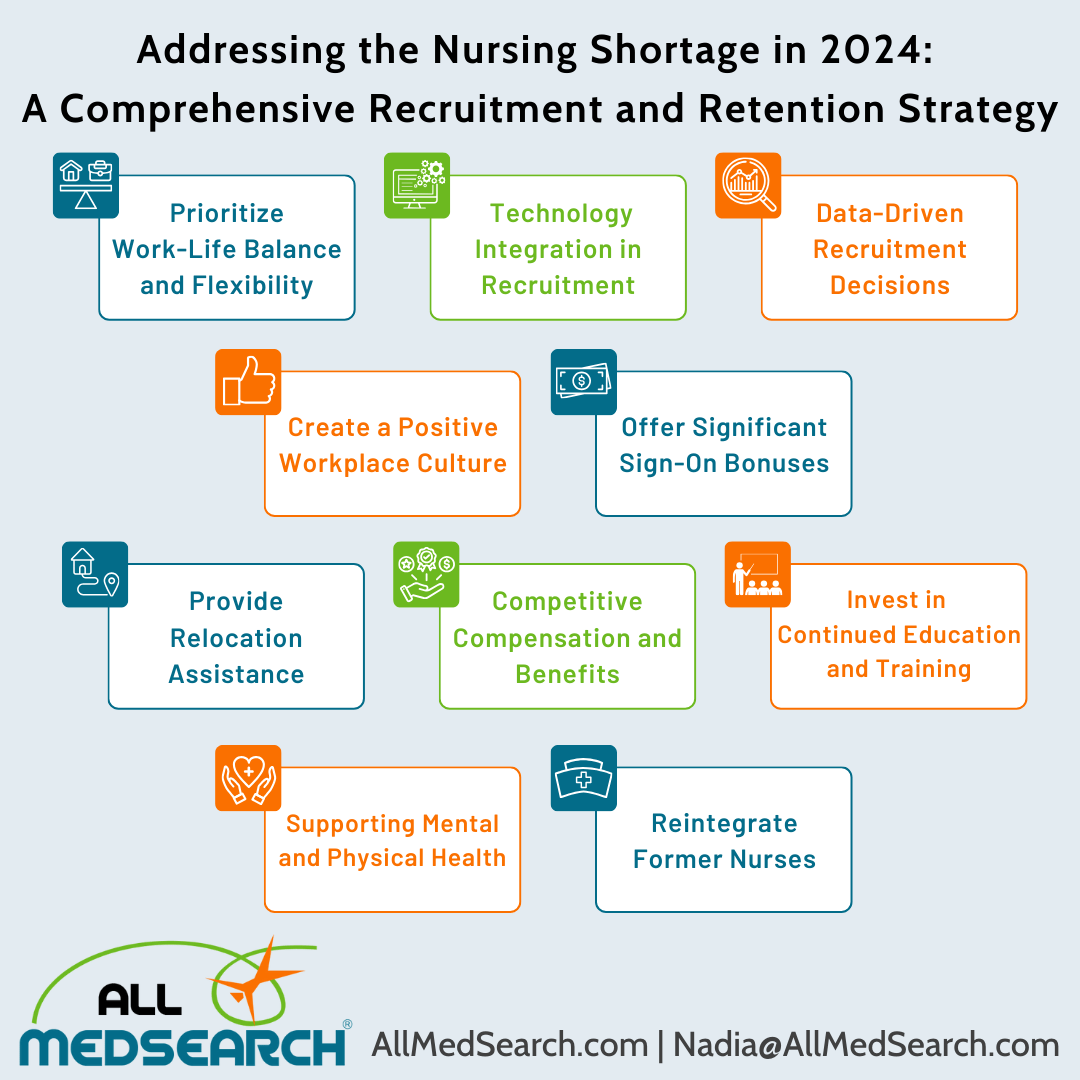
The U.S. healthcare sector is confronting an alarming workforce crisis. The pandemic led to the exit of 100,000 nurses and, by 2027, nearly 900,000 registered nurses are expected to leave the profession, representing a significant portion of the total RN workforce (NCSBN, 2023). Additionally, the American Hospital Association anticipates a shortage of up to 124,000 physicians by 2033 (Oracle, 2023). This crisis is set against the backdrop of an anticipated total shortage of 1.1 million nurses by the end of 2023 (News Nation Now, 2023), necessitating innovative and effective recruitment strategies.
Comprehensive Recruitment and Retention Strategies
Prioritizing Work-Life Balance and Flexibility:
Flexible scheduling and robust wellness programs in high-demand areas like Emergency Rooms, ICUs, and Med-Surg units are crucial for enhancing job satisfaction and retention among bedside nurses.
Technology Integration in Recruitment:
Utilizing AI, machine learning, and automation in recruitment processes is essential for improving efficiency in hiring.
Creating a strong employer brand that showcases organizational culture, values, and commitment to employee development attracts top talent.
Data-Driven Recruitment Decisions:
Leveraging data analytics to understand recruitment patterns and candidate preferences informs strategic hiring decisions.
Creating a Positive Workplace Culture:
Fostering a supportive environment with recognition programs and mentorship opportunities is vital for attracting and nurturing talent.
Offering Significant Sign-On Bonuses:
Implementing substantial sign-on bonuses is a strategic move to attract healthcare professionals in a competitive market.
Providing Relocation Assistance:
Relocation support addresses geographical imbalances and encourages talent from regions with a surplus of nurses to fill positions in shortage areas.
Competitive Compensation and Benefits:
Offering competitive compensation packages with comprehensive benefits is crucial in attracting and retaining healthcare professionals.
Investing in Continued Education and Training:
Continuous education and specialization opportunities increase the appeal of healthcare institutions for career development.
Supporting Mental and Physical Health:
Prioritizing the mental and physical well-being of staff, including adequate breaks and mental health support, is essential for retention.
Reintegrating Former Nurses:
Retraining programs and understanding the career needs of ex-nurses can help reintegrate them into the workforce.
The Pivotal Role of All Med Search:
With over 34 years of experience, All Med Search, led by award-winning healthcare recruiting expert Nadia Gruzd, has consistently excelled in placing healthcare professionals into full-time, permanent roles at healthcare facilities across the USA. This track record not only highlights their proficiency in Recruitment Process Outsourcing (RPO) but also underscores their deep understanding of the healthcare industry’s diverse staffing needs.
All Med Search’s approach is tailored to each organization’s unique vision and needs, developing adaptable and scalable talent acquisition models. Specializing in recruiting RNs, Allied Health Professionals, Healthcare Executives, and Coders for facilities across the USA, they are known for their customized solutions. These solutions effectively tackle various recruitment challenges, ensuring the right fit for each organization’s success.
Conclusion:
The nursing and clinician shortage in 2024 requires a multifaceted approach, including flexible work environments, advanced technology, significant sign-on bonuses, relocation assistance, competitive compensation, and a focus on mental and physical health. Partnering with specialized services like All Med Search is key to securing top talent and ensuring high-quality patient care in a challenging healthcare environment.
